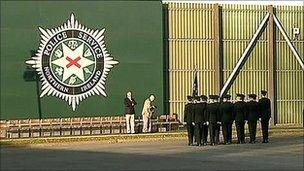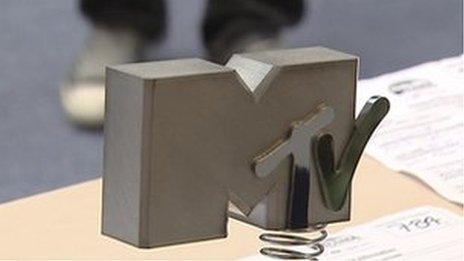Policing, Patten and ten years of the PSNI
- Published

After 10 years, 30% of all PSNI officers are now Catholic.
The Police Service of Northern Ireland has come a long way in a decade.
When it replaced the Royal Ulster Constabulary in November 2001, republicans would not support it, unionists were opposed to half of all new recruits being Catholic, and there were questions about how effective the force would be in a rapidly changing Northern Ireland.
But much has altered in 10 years.
Catholic officers now make up 30% of the PSNI, 50-50 recruitment ended in 2011, Sinn Fein MLAs sit on the Policing Board and just two months ago officers were invited to speak to pupils in Catholic schools.
There have been many challenges to overcome. Two PSNI officers have been murdered by dissident republicans.
Constable Stephen Carroll was shot dead in Craigavon in March 2009. In April 2011 Constable Ronan Kerr was killed by a car bomb outside his Omagh home.
Others, such as Constable Paedar Heffron, have been severely injured, or had close escapes in other attacks blamed on dissident republicans.
The last decade has seen the PSNI transform, according to the guidelines laid down in the Good Friday Agreement by Chris Patten.
The Patten Recommendations aimed to make the police service more welcoming to the Catholic community and much more representative of Northern Ireland.
Unionists were initially opposed to the changes Patten suggested. They were upset over the dropping of the Royal prefix, the removal of the Union Flag from police stations and the increase in Catholic recruits.
Powers devolved
In April 2002, the first PSNI passing out parade at Garnerville was unrecognisable from the last of the RUC a short time before. Different badge, different uniform, different people.
But Sinn Fein stalled on giving their full support to the PSNI until the party was satisfied with the changes the police had made.
Republicans finally gave their hugely symbolic backing to the PSNI at an ard fheis in Dublin in January 2007. Sinn Fein MLAs joined the Policing Board shortly afterwards and have been members ever since.
A further landmark for the PSNI came in April 2010 when policing and justice powers were devolved to Northern Ireland. Alliance leader David Ford became the first local Justice Minister since 1972, when powers were transferred to Westminster.
And what of the men at the top of the organisation?
Sir Ronnie Flanagan, with 30 years' experience in the RUC, led the transformation to the PSNI before stepping down in 2002.
Sir Ronnie was replaced by an Englishman, Sir Hugh Orde, who accelerated the pace of change in the PSNI over his seven years in charge. When he resigned in 2009, Matt Baggott became the third chief constable of the PSNI.
He has warned of the continued threat from dissident republicans across Northern Ireland.
Looking to the future, a new police training college was recently given the go-ahead to be built in County Tyrone. From 2015, PSNI officers will be trained in a £139m purpose built college at Desertcreat, outside Cookstown.
Yet more change and yet another way in which the PSNI has moved forward over the past decade in Northern Ireland.
- Published4 November 2011

- Published4 November 2011
- Published1 November 2011

- Published26 September 2011
